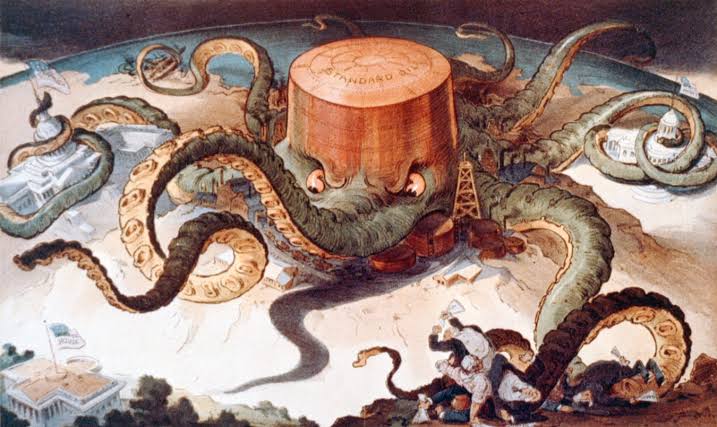Although John D. Rockefeller’s Standard Oil Company Monopoly is sometimes accused even today of having engaged in predatory pricing, honest scholars stopped making the accusation after John W. McGee’s classic 1958 article in the Journal of Law and Economics. Rockefeller acquired his position, McGee showed, by means of mergers and acquisitions voluntarily entered into by his competitors, and not by predatory pricing. These opponents were browbeaten into accepting poor offers from Rockefeller, some say. To the contrary, Standard Oil typically employed the managers and owners of the firms they acquired, even making them shareholders. Had these managers and owners really been treated poorly, they would not have been desirable employees. “Victimized ex-rivals,” McGee writes, “might be expected to make poor employees and dissident or unwilling shareholders.”
McGee also provides examples of people who made excellent livings establishing refineries and selling them to Standard Oil. In most cases, competing firms approached Rockefeller and asked to be acquired. Knowing that his costs were lower than theirs, they chose absorption rather than being driven from the field altogether. (As another scholar explained, Critics also have accused Rockefeller of competing unfairly by selling below cost, but he wasn’t selling below his cost, he was just selling below most competitors’ costs.”)
Standard Oil Company’s “Monopoly”
The Standard Oil Company, typically excoriated and condemned in junior high and high school textbooks, was, in fact, an excellent example of American ingenuity and efficiency, and provided considerable benefits to the great mass of consumers. Until the 1850s, crude oil had been nothing but a nuisance to farmers who found it seeping from their soil. But when Yale University chemist Benjamin Silliman discovered in 1855 that it could be refined into kerosene, a better and potentially less expensive illuminant than the whale oil then in widespread use, the only question was whether it could ever be collected in sufficient quantities to make it marketable. When Silliman silenced skeptics by drilling for oil in 1859, this useless substance suddenly took on a tremendous value.
Cite This Article
"Standard Oil Company’s Monopoly—True or Not?" History on the Net© 2000-2024, Salem Media.
July 24, 2024 <https://www.historyonthenet.com/standard-oil-company-monopoly>
More Citation Information.
